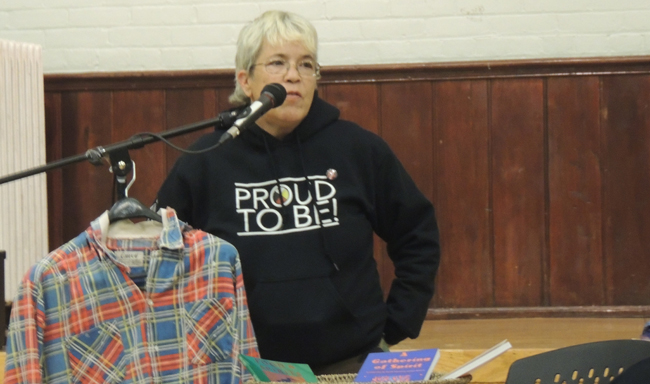Writer Beth Brant’s life celebrated

By Christine Smith (McFarlane)
TORONTO – An old shirt that writer Beth Brant used to wear, hung on a microphone stand on Oct. 23 at the Native Canadian Centre of Toronto. The shirt was passed down to Brant from her grandpa and it represented her there in spirit.
A small crowd gathered to pay tribute to the life of this Indigenous writer who was a Bay of Quinte Mohawk from Tyendinaga Mohawk Territory. She passed on into the Spirit World in early September.
Brant was a very powerful Indigenous writer who impacted many in her lifetime. In her writing she identified her complex identity. Mohawk, mixed-blood, First Nations, lesbian, urban, not educated in the western “tradition” (her words, in Writing as Witness).
Nicole Tanguay, a long-time member of the First Nations community in Toronto decided that when she heard that Brant had passed on that she get people together to celebrate Beth’s life. She came up with the “In Spirit of Beth Brant” committee.
“I thought it was needed to have a celebration of her life due to the fact that we felt like her life should be honoured and to give her family a gift of closure,” said Tanguay. “There was little mention in the literary world that she had passed, and I felt given that she was such a powerful writer that there needed to be something that honoured not just her life but her words. I also felt it was important to honour her to show case her work and books and make sure her voice continues to be heard.”
Beth began writing at the age of 40 and created a very significant body of work. Her books include:
Mohawk Trail, 1981
A Gathering of Spirit: A Collection by North American Indian Women, 1984
Food & Spirit: stories, 1991
Writing as Witness: essay and talk, 1994
I’ll sing to the day I die: conversations with Tyendinaga Elders, 1995
In her writing, Brant challenged racism, colonialism, sexism, classism, homophobia – all oppression – while she advocated, with huge tenderness, for love.
“Personally, I wanted to honour her as a two-spirited fierce Mohawk woman that inspired me to continue to write,” added Tanguay. “To speak the truths of being a mixed race indigenous woman. So often we are forgotten. Left out of the literary world and put aside for other writers. Beth was kind, intelligent and her love for our people shone through every thing she did. She always encouraged me to speak from my own voice, not someone else’s idea of what we should write, but write from the heart. She always talked about love and how that inspired her to write. Her love for her people and nation.”
Beth was the recipient of an Ontario Council award, a Canada Council grant and a National Endowment for the Arts Literature Fellowship. She taught at the University of Toronto and University of British Columbia.


